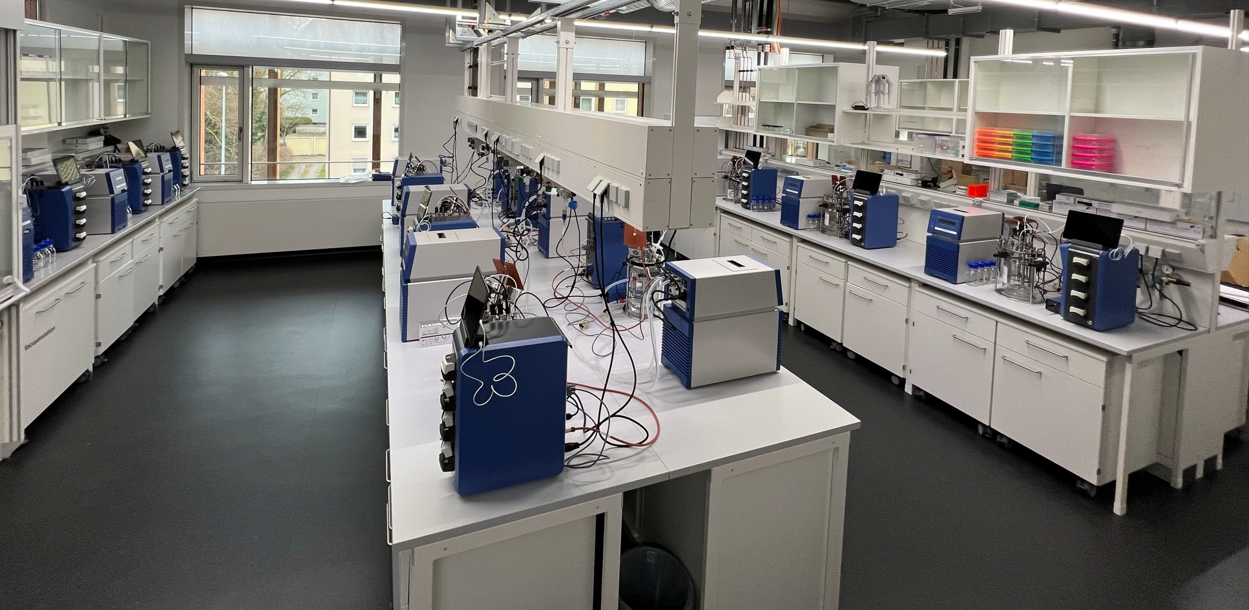
Projects
- SynergyFuels – Synergies through integration of biomass utilization with Power-to-x for the production of renewable fuels.
The development of bacterial strains and process methods to produce isobutanol from industrial waste streams, specifically using wheat straw hydrolysate is one of the aspects of the project. The purpose of the work is to develop a more sustainable route for isobutanol production using different strains of Corynebacterium glutamicum. Additionally, testing, development and establishing of in-situ product removal methods is another aspect of the project. The Synergy Fuels project is funded by the German Federal Ministry for Digital Affairs and Transport. www.synergyfuels.de
- Tolerant fermentation processes for hydrolysates
The research focuses on having optimal control of industrial fermentation processes that are affected by batch-to-batch fluctuations when using hydrolysates derived from agricultural residues. Unlocking the full potential of bioprocess data, enabling faster troubleshooting, enhancing process automation and reducing the need for time-consuming and costly offline measurements by development of continuously trained, validated and improved hybrid model-based soft-sensors is the key objective. The process control involves the combination of real-time data from hardware sensors with specifically designed models to predict non-measurable parameters online.
- SoftSens – Soft-Sensors for the optimal control of industrial fermentation processes.
For industrial biotechnology, efficient fermentation processes are crucial. For this purpose, a soft sensor will be developed to optimally control of a specific bioprocess and thus achieve maximum yields in minimum fermentation time. The soft sensor will continuously measure process parameters, which cannot be measured directly with conventional hardware sensors, based on a model. The project consists of a theoretical programming aspect in addition to a practical fermentation aspect using Escherichia coli.
- Fermentative production of exopolysaccharides
This research project deals with the production, scale-up and downstream processing of biopolymers and exopolysaccharides from different microbial strains for various applications involving sustainable materials or methods. Development of such products has certain hurdles like downstream process of the viscous broth, sensitivity of the products to water and environmental conditions, scale-up, etc. when considering commercial application currently. Overcoming such hurdles and development of sustainable biodegradable materials is the main aim of the research.
PolyFerm – New processes for biopolymer production
Specific biotechnological production processes experience a viscosity increase of the reaction media as the product concentration increases. This is especially important for microbial biopolymer production where oxygen transfer becomes limiting as the fermentation reaction advances. The aim of this research project is to improve and innovate conventional reactor systems for such applications by use of additive manufacturing (AM) and computational fluid dynamics (CFD) as testing platforms. The work focuses on specific stage optimization including final product recovery, while prioritizing the economic viability of the whole manufacturing process.
- C1TOCO – Biotechnological conversion of methanol (C1) to tocochromanols
The aim of this project is to convert methanol, which can be produced from CO2, into antioxidant substances in the form of a fermentative process. These are particularly important for the feed industry to stabilise feed with increased fat content. The aim of this research is to develop and optimise a methanol-based production process, which consists of fermentation with the microorganism Saccharomyces cerevisiae and the subsequent processing of the target substances. The project includes economic feasibility studies from the beginning to ensure economic viability.
- TransBIB
The Transfer network for Boosting Industrial Bioeconomy (TransBIB), funded by the German Federal Ministry for Economic Affairs and Climate Protection (BMWK) aims to reduce Germany’s dependence on non-renewable resources by facilitating faster transfer of biotechnological production processes from the lab into industrial scale. BVT supports TransBIB by generating process simulations for the up-scaling of biotechnological production processes. In addition, a database on capital and operating costs of industrial scale facilities will be established. Finally, the project aims to support start-ups and small and medium enterprises in scaling up by sharing information on the necessary permits, procedures and timelines to be considered when designing and building such facilities. Link: TransBIB (Transfernetzwerk zur Beschleunigung industrieller Bioökonomie)
- CirculH2
CirculH2 project, funded by the European Research Executive Agency (REA), aims to demonstrate the successful development of one or more highly robust and scalable hydrogenases for the use of H2 that selectively drives biotransformation of bio-based materials to specialty and commodity chemicals in an industrial environment. The technology aims to replace the heavily used conventional chemical production methods and enable the decarbonization of industrial biotechnology.BVT develops the industrial-scale production of FeFe-hydrogenase within the CirculH2 project. This will involve upscaling the fermentation of E. coli, which serves as the source of our resilient hydrogenase enzyme.
